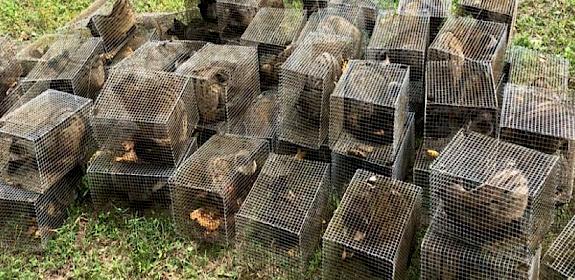Wildlife law enforcers build skills to combat illegal wildlife trade
Ho Chi Minh City, Viet Nam, 21st-23rd February 2011—Law enforcers are being trained this week on how to identify threatened reptile species and familiarize themselves with international wildlife protection policies in an effort to combat illegal wildlife trade in the ASEAN region.
The workshop will be led by Vietnamese trainers who attended a “Training of Trainers” for members of the ten ASEAN nations last month in Malaysia, as part of a project funded by the Japan-ASEAN Integration Fund and Ministry of the Environment, Japan under the East and Southeast Asia Biodiversity Information Initiative (ESABII).
The project seeks to involve and enhance the capabilities of ASEAN and neighbouring countries in the understanding and application of taxonomic knowledge and wildlife trade regulations.
Viet Nam is the first country in the region to be selected to organize its own CITES and species identification course, conducted entirely by national trainers.
The three-day course will equip key staff working in land and air ports in southern Viet Nam with basic knowledge of the wildlife trade in Southeast Asia, international regulations governing the trade, such as CITES (the Convention on International Trade in Endangered Species of Wild Fauna and Flora), and relevant national laws. Participants will also be trained to identify threatened reptile species that are commonly traded in the region during an interactive session at the Saigon Zoo.
Illegal wildlife trade has been identified as one of the greatest threats to the region’s biodiversity. In his opening speech, Dr Ha Cong Tuan, Deputy Director of Viet Nam’s Directorate of Forestry, said: “This training will help equip law enforcers who are working to control international wildlife trade with the skills to more effectively protect and sustainably use our precious natural resources.”
Mr. Manop Lauprasert, Senior Officer of the ASEAN-Wildlife Enforcement Network (ASEAN-WEN) Program Coordination Unit, which is supporting the training, added “Criminal networks are taking advantage of limited enforcement capacity at land, sea and airports across the region. Training initiatives such as this will help to close these gaps, and prevent wildlife from being smuggled across international borders. The ASEAN WEN PCU is encouraged to see countries take such important steps to end the illegal wildlife trade”.
There is increasing recognition that wildlife trade, both legal and illegal, is becoming more common at international ports, therefore capacity building for airport and land port staff plays an important role in stopping wildlife trafficking.
Regional Director of TRAFFIC Southeast Asia, Dr. William Schaedla said, “This course is not only helping to impart the necessary knowledge and skills to front line enforcement officers and other key stakeholders, but also supporting Vietnamese officials to continue to lead such capacity building initiatives.”
The training course will be conducted by the Viet Nam CITES Management Authority, Biodiversity Conservation Agency and Natural Museum with support from TRAFFIC Southeast Asia, Ministry of the Environment of Japan, and ASEAN-WEN.
Notes:
• Viet Nam’s CITES Management Authority, which belongs to Viet Nam’s Directorate of Forestry, Ministry of Agriculture and Rural Development, is the representative of the Socialist Republic of Viet Nam in the implementation of the Convention on International Trade in Endangered Species of Wild Fauna and Flora (CITES), and is the ASEAN-WEN focal point within the country.
• The ASEAN Wildlife Enforcement Network (ASEAN-WEN) aims to address illegal exploitation and trade in CITES-listed species within the ASEAN region. It is an integrated network among law enforcement agencies in the 10 ASEAN Member States (Brunei Darussalam, Cambodia, Indonesia, Lao PDR, Malaysia, Myanmar, the Philippines, Singapore, Thailand, and Viet Nam), involving CITES authorities, customs, police, prosecutors, specialized governmental wildlife-law enforcement organizations and other relevant national law enforcement agencies. This ten member network also aims at facilitating cross border collaboration to fight against illegal wildlife trade in the region. For more information, visit www.asean-wen.org




